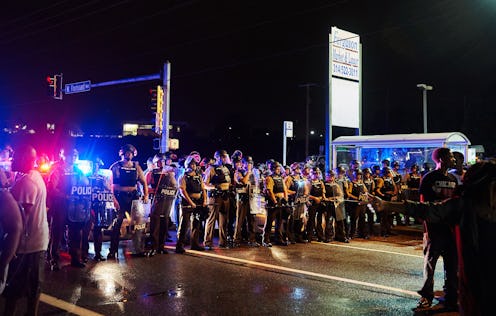News
What's Next For Officers Who Shot Tyrone Harris?
The attention on cases of white police officers shooting black people is steadily growing. But such an incident repeating in the same location showcases a large degree of mistrust between police and communities. On Sunday's anniversary of the shooting of Michael Brown, protesters allegedly threw rocks and bottles at officers and even shot at police vehicles, according to the St. Louis County Police Department. Police fired back and allegedly critically injured Tyrone Harris, a protester and apparently a friend of Brown's. But what will happen to the officers who allegedly shot Harris? St. Louis Police Sergeant Brian Schellman tells Bustle that the names of the four officers involved in the shooting would not be released unless they're charged with a crime, according to standard protocol.
For now, the officers have been put on administrative leave, according to St. Louis County Police Chief Jon Belmar in a press conference held Monday morning. Administrative leave is a common practice for an officer after a shooting. It generally includes pay and benefits, and doesn't equate to any fault with his or her actions at the time.
The four detectives will face an investigation, as officials try to decipher what happened on Sunday night. According to the FBI, impartial investigators with "empathy toward the involved officers and members of the general public" review the evidence after every police shooting. They will oversee the crime scene investigation, review witness statements and laboratory evidence, and work with the criminal justice system.
The officers involved in a shooting have to be removed from the scene as soon as possible. They must go to a secure location, where witnesses and reporters can't influence their memories by sharing their own accounts or asking leading questions. To further ensure their protection, authorities will not release the officers' names at this early stage of the investigation.
Investigators have to keep the involved officers informed about their findings. The detectives might be assigned an advocate who will help with peer support, union backing, and legal aid. The impartial investigators might have to go through the officers' advocates to arrange questionings.
According to the Department of Justice (DOJ), the legal test of excessive force is "whether the police officer reasonably believed that such force was necessary to accomplish a legitimate police purpose." If the officers believed that their lives were in danger, they probably will not be found guilty of using excessive force. However, they were not wearing body cameras, so it's hard to say whether Harris actually was a threat.
The DOJ says that officers convicted of using excessive force can be federally prosecuted and face jail time. This soon after the violence, it's unclear what the investigators will find or what punishment the involved officers might face. However, according to the FBI, the affected police department needs to keep the public apprised to foster community trust in law enforcement.
